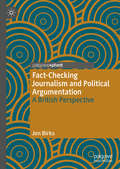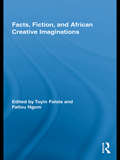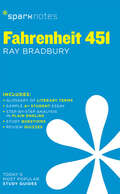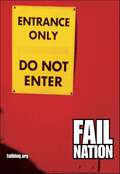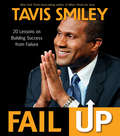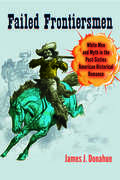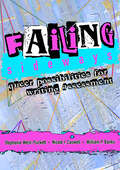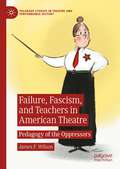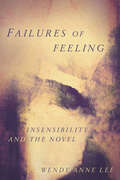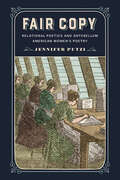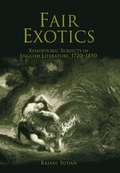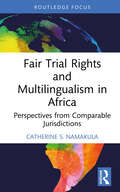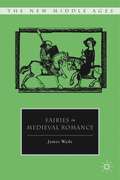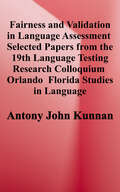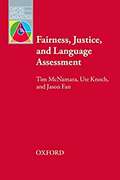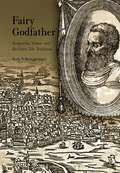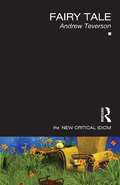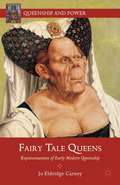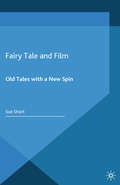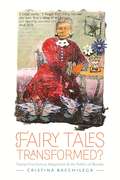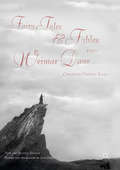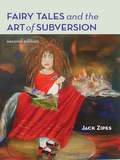- Table View
- List View
Fact-Checking Journalism and Political Argumentation: A British Perspective
by Jen BirksThis timely book examines the role of fact-checking journalism within political policy debates, and its potential contribution to public engagement. Understanding facts not to operate in a political vacuum, the book argues for a wide remit for fact-checking journalism beyond empirically-checkable facts, to include the causal relationships and predictions that form part of wider political arguments and are central to electoral pledges. Whilst these statements cannot be proven or disproven, fact-checking can, and sometimes does, ask pertinent critical questions about the premises of those claims and arguments. The analysis centres on the three dedicated national British fact-checkers during the UK’s 2017 snap general election, including their activity and engagement on Twitter. The book also makes a close political discourse and argumentation analysis of three key issue debates in flagship reporting from Channel 4 News and the BBC.
Facts, Fiction, and African Creative Imaginations (Routledge African Studies)
by Toyin Falola Fallou NgomThis volume brings together insights from distinguished scholars from around the world to address the facts, fiction and creative imaginations in the pervasive portrayals of Africa, its people, societies and cultures in the literature and the media. The fictionalization of Africa and African issues in the media and the popular literature that blends facts and fiction has rendered perceptions of Africa, its cultures, societies, customs, and conflicts often superficial and deficient in the popular Western consciousness. The book brings eminent scholars from a variety of disciplines to sort out the persistent fictionalization of Africa, from facts pertaining to the genesis of powerful cultural, political or religious icons, the historical and cultural significance of "intriguing" customs (such as tribal marks), gender relations, causes of conflicts and African responses, and creative imaginations in contemporary African films, fiction and literature, among others.
Fahrenheit 451 SparkNotes Literature Guide (SparkNotes Literature Guide Series)
by Ray Bradbury SparkNotesFahrenheit 451 SparkNotes Literature Guide by Ray Bradbury Making the reading experience fun! When a paper is due, and dreaded exams loom, here's the lit-crit help students need to succeed! SparkNotes Literature Guides make studying smarter, better, and faster. They provide chapter-by-chapter analysis; explanations of key themes, motifs, and symbols; a review quiz; and essay topics. Lively and accessible, SparkNotes is perfect for late-night studying and paper writing. Includes:An A+ Essay—an actual literary essay written about the Spark-ed book—to show students how a paper should be written.16 pages devoted to writing a literary essay including: a glossary of literary termsStep-by-step tutoring on how to write a literary essayA feature on how not to plagiarize
Fail Nation: A Visual Romp Through The World Of Epic Fails
by failblog.orgFrom the underbelly of the nuts behind hit websites failblog.org and icanhascheezburger.com comes FAIL Nation, your silent guide and handler to the not-even-close-to-perfect nation of FAIL, chock-full of irrelevant tips and useless suggestions about why to shop, who to eat, and when to see. So fasten your exit and check for the nearest seatbelt—your FAIL plane departs now.
Fail Up: 20 Lessons On Building Success From Failure
by Tavis Smiley"Failure is an inevitable part of the human journey," says award-winning television and radio broadcaster and New York Times best-selling author Tavis Smiley. Smiley steps from behind the curtain of success to share intimate stories of his missteps, misdeeds, and often highly publicized miscalculations in Fail Up: 20 Lessons On Building Success From Failure. These instances of perceived "failures" were, in fact, "lessons" that shaped the principles and practices that now guide his life. Readers will find a kinship in Smiley’s humanness that inspires, informs, and reminds us of our ability to "fail up" in the face of life’s inevitable setbacks. The year-long celebration of Smiley’s 20th year anniversary in broadcasting will feature the Fail Up book tour.
Failed Frontiersmen: White Men and Myth in the Post-Sixties American Historical Romance (Cultural Frames, Framing Culture)
by James J. DonahueIn Failed Frontiersmen, James Donahue writes that one of the founding and most persistent mythologies of the United States is that of the American frontier. Looking at a selection of twentieth-century American male fiction writers—E. L. Doctorow, John Barth, Thomas Pynchon, Ishmael Reed, Gerald Vizenor, and Cormac McCarthy—he shows how they reevaluated the historical romance of frontier mythology in response to the social and political movements of the 1960s (particularly regarding the Vietnam War, civil rights, and the treatment of Native Americans). Although these writers focus on different moments in American history and different geographic locations, the author reveals their commonly held belief that the frontier mythology failed to deliver on its promises of cultural stability and political advancement, especially in the face of the multicultural crucible of the 1960s. Cultural Frames, Framing Culture American Literatures Initiative
Failing Sideways: Queer Possibilities for Writing Assessment
by William P. Banks Nicole I. Caswell Stephanie West-PuckettFailing Sideways is an innovative and fresh approach to assessment that intersects writing studies, educational measurement, and queer rhetorics. While valuing and representing the research, theory, and practice of assessment, authors Stephanie West-Puckett, Nicole I. Caswell, and William P. Banks demonstrate the ways that students, teachers, and other interested parties can find joy and justice in the work of assessment. A failure-oriented assessment model unsettles some of the most common practices, like rubrics and portfolios, and challenges many deeply held assumptions about validity and reliability in order to ask what could happen if assessment was oriented toward possibility and potential. Working to engage a more capacious writing construct, the authors propose queer validity inquiry (QVI) as a model for assessment that values failure, affect, identity, and materiality. These overlapping lenses help teachers honor parts of writing and learning that writing studies faculty have struggled to hold onto in a world overly focused on quickness and efficiency in schools. Through programmatic and classroom examples, Failing Sideways privileges what is valued in the classroom but traditionally ignored in assessments. Reimagining what matters in the teaching and learning of writing and using assessment data differently, this book demonstrates what writing can be and could do in a more diverse and just world.
Failure and the American Writer
by Gavin JonesIf America worships success, then why has the nation's literature dwelled obsessively on failure? This book explores encounters with failure by nineteenth-century writers - ranging from Edgar Allan Poe and Herman Melville to Mark Twain and Sarah Orne Jewett - whose celebrated works more often struck readers as profoundly messy, flawed, and even perverse. Reading textual inconsistency against the backdrop of a turbulent nineteenth century, Gavin Jones describes how the difficulties these writers faced in their faltering search for new styles, coherent characters, and satisfactory endings uncovered experiences of blunder and inadequacy hidden in the culture at large. Through Jones's treatment, these American writers emerge as the great theorists of failure who discovered ways to translate their own social insecurities into complex portrayals of a modern self, founded in moral fallibility, precarious knowledge, and negative feelings.
Failure, Fascism, and Teachers in American Theatre: Pedagogy of the Oppressors (Palgrave Studies in Theatre and Performance History)
by James F. WilsonThis timely and accessible book explores the shifting representations of schoolteachers and professors in plays and performances primarily from the twentieth and twenty-first centuries in the United States. Examining various historical and recurring types, such as spinsters, schoolmarms, presumed sexual deviants, radicals and communists, fascists, and emasculated men teachers, Wilson shines the spotlight on both well-known and nearly-forgotten plays. The analysis draws on a range of scholars from cultural and gender studies, queer theory, and critical race discourses to consider teacher characters within notable education movements and periods of political upheaval. Richly illustrated, the book will appeal to theatre scholars and general readers as it delves into plays and performances that reflect cultural fears, desires, and fetishistic fantasies associated with educators. In the process, the scrutiny on the array of characters may help illuminate current attacks on real-life teachers while providing meaningful opportunities for intervention in the ongoing education wars.
Failures of Feeling: Insensibility and the Novel
by Wendy Anne LeeThis book recovers the curious history of the "insensible" in the Age of Sensibility. Tracking this figure through the English novel's uneven and messy past, Wendy Anne Lee draws on Enlightenment theories of the passions to place philosophy back into conversation with narrative. Contemporary critical theory often simplifies or disregards earlier accounts of emotions, while eighteenth-century studies has focused on cultural histories of sympathy. In launching a more philosophical inquiry about what emotions are, Failures of Feeling corrects for both of these oversights. Proposing a fresh take on emotions in the history of the novel, its chapters open up literary history's most provocative cases of unfeeling, from the iconic scrivener who would prefer not to and the reviled stock figure of the prude, to the heroic rape survivor, the burnt-out man-of-feeling, and the hard-hearted Jane Austen herself. These pivotal cases of insensibility illustrate a new theory of mind and of the novel predicated on an essential paradox: the very phenomenon that would appear to halt feeling and plot actually compels them. Contrary to the assumption that fictional investment relies on a richness of interior life, Lee shows instead that nothing incites the passions like dispassion.
Fair Copies
by Matthew ZarnowieckiIn the latter half of the sixteenth century, English poets and printers experimented widely with a new literary format, the printed collection of lyric poetry. They not only investigated the possibilities of working with a new medium, but also wrote metaphors of human reproduction directly into their works. In Fair Copies, Matthew Zarnowiecki argues that poetic production was re-envisioned during this period, which was rife with models of copying and imitation, to include reproduction as one of its inherent attributes.Tracing the development of the English lyric during this crucial period, Fair Copies incorporates a diverse range of cultural productions and reproductions - from key poetic texts by Shakespeare, Sidney, Spenser, Gascoigne, and Tottel to legal breviaries, visual representations of song, midwives' manuals, and commonplace books. Also included are fifteen facsimile reproductions of poems in early printed books, with explanations and discussions of their importance. Calling upon these diverse sources, and examining lyric poems in their earliest manuscript and printed contexts, Zarnowiecki develops a new, reproductively centred method of reading early modern English lyric poetry.
Fair Copy: Relational Poetics and Antebellum American Women's Poetry (Material Texts)
by Jennifer PutziIn Fair Copy Jennifer Putzi studies the composition, publication, and circulation of American women's poetry in the antebellum United States. In opposition to a traditional scholarly emphasis on originality and individuality, or a recovery method centered on author-based interventions, Putzi proposes a theory and methodology of relational poetics: focusing on poetry written by working-class and African American women poets, she demonstrates how an emphasis on relationships between and among people and texts shaped the poems that women wrote, the avenues they took to gain access to print, and the way their poems functioned within a variety of print cultures. Yet it is their very relationality which has led to these poems and the poets who published them being written out of literary history. Fair Copy models a radical reading and recovery of this work in a way that will redirect the study of nineteenth-century American women's poetry.Beginning with Lydia Huntley Sigourney and ending with Elizabeth Akers Allen and Frances Ellen Watkins Harper, Putzi argues that relational practices like imitation, community, and collaboration distinguished the poetry of antebellum American women, especially those whose access to print was mediated by class or race. To demonstrate this point, she recovers poetry by the "factory girls" of the Lowell Offering, African American poet Sarah Forten, and domestic servant Maria James, whose volume Wales, and Other Poems was published in 1839. Putzi's work reveals a careful navigation of the path to print for each of these writers, as well as a fierce claim to poetry and all that it represented in the antebellum United States.
Fair Exotics: Xenophobic Subjects in English Literature, 1720-1850 (New Cultural Studies)
by Rajani SudanArguing that the major hallmarks of Romantic literature—inwardness, emphasis on subjectivity, the individual authorship of selves and texts—were forged during the Enlightenment, Rajani Sudan traces the connections between literary sensibility and British encounters with those persons, ideas, and territories that lay uneasily beyond the national border. The urge to colonize and discover embraced both an interest in foreign "fair exotics" and a deeply rooted sense of their otherness.Fair Exotics develops a revisionist reading of the period of the British Enlightenment and Romanticism, an age during which England was most aggressively building its empire. By looking at canonical texts, including Defoe's Robinson Crusoe, Johnson's Dictionary, De Quincey's Confessions of an English Opium Eater, and Bronte's Villette, Sudan shows how the imaginative subject is based on a sense of exoticism created by a pervasive fear of what is foreign. Indeed, as Sudan clarifies, xenophobia is the underpinning not only of nationalism and imperialism but of Romantic subjectivity as well.
Fair Trial Rights and Multilingualism in Africa: Perspectives from Comparable Jurisdictions (Law, Language and Communication)
by Catherine S. NamakulaThis book examines the best language fair trial practices of the courts in arguably the most multilingual region of the world. It contains an instructive list of standards and approaches to linguistic dynamics, which may be considered a language fair trial rights code. By way of jurisprudential analysis and scrutiny of constitutional imperatives and examination of legislation among the respective jurisdictions from the Sahel region, to the Horn of Africa, and the Cape, this publication presents peculiar country-specific practices and common standards aiming towards the realisation of a fair trial in a multilingual context. The exceptionally multilingual nature of legal processes in Africa makes the standards in the region instructive in the progression towards a universal language fair trial rights code. The book reveals valuable lessons across jurisdictions, including those outside Africa, and suggests measures that may be taken to improve existing approaches. It will be a valuable resource for academics, researchers, and policy-makers working in the areas of Law and Language, Legal Linguistics, Forensic Linguistics, Criminal Justice, and Comparative Law.
Fairies in Medieval Romance
by James WadeThis is the first book to construct a theoretical framework that not only introduces a new way of reading romance writing at large, but more specifically that generates useful critical readings of the specific functions of fairies in individual romance texts.
Fairness and Validation in Language Assessment: Selected papers from the 19th Language Testing Research Colloquium, Orlando, Florida (Studies in Language Testing #9)
by Antony John KunnanFairness of language tests and testing practices has always been a concern among test developers and test users. In the past decade educational and language assessment researchers have begun to focus directly on fairness and related matters such as test standards, test bias and equity and ethics for testing professionals. <p><p>The 19th annual Language Testing Research Colloquium held in 1997 in Orlando, Florida, brought this overall concern into sharp focus by having 'Fairness in Language Testing' as its theme. The conference presentations and discussions attempted to understand the concept of fairness, define the scope of the concept and connect it with the concept of validation of test score interpretation. The papers in this volume offer a first introduction to fairness and validation in the field of language assessment.
Fairness, Justice, and Language Assessment
by Tim McNamara Ute Knoch Oxford Editors Jason FanThis book has two goals, each related to the validity of language assessment. The first goal is to explore the difference between fairness and justice in language assessment. <p><p> The authors distinguish internal and external dimensions of the equitable and just treatment of individuals taking language tests which are used as gatekeeping devices to determine access to education and employment, immigrant status, citizenship, and other rights. <p><p> The second goal is to show how the extent of test fairness can be demonstrated and improved using the tools of psychometrics, in particular the models collectively known as Rasch measurement.
Fairy Godfather
by Ruth B. BottigheimerIn the classic rags-to-riches fairy tale a penniless heroine (or hero), with some magic help, marries a royal prince (or princess) and rises to wealth. Received opinion has long been that stories like these originated among peasants, who passed them along by word of mouth from one place to another over the course of centuries. In a bold departure from conventional fairy tale scholarship, Ruth B. Bottigheimer asserts that city life and a single individual played a central role in the creation and transmission of many of these familiar tales. According to her, a provincial boy, Zoan Francesco Straparola, went to Venice to seek his fortune and found it by inventing the modern fairy tale, including the long beloved Puss in Boots, and by selling its many versions to the hopeful inhabitants of that colorful and commercially bustling city.With innovative literary sleuthing, Bottigheimer has reconstructed the actual composition of Straparola's collection of tales. Grounding her work in social history of the Renaissance Venice, Bottigheimer has created a possible biography for Straparola, a man about whom hardly anything is known. This is the first book-length study of Straparola in any language.
Fairy Tale (The New Critical Idiom)
by Andrew TeversonThis volume offers a comprehensive critical and theoretical introduction to the genre of the fairy tale. It: explores the ways in which folklorists have defined the genre assesses the various methodologies used in the analysis and interpretation of fairy tale provides a detailed account of the historical development of the fairy tale as a literary form engages with the major ideological controversies that have shaped critical and creative approaches to fairy tales in the twentieth and twenty-first centuries demonstrates that the fairy tale is a highly metamorphic genre that has flourished in diverse media, including oral tradition, literature, film, and the visual arts.
Fairy Tale Queens
by Jo Eldridge CarneyMost of today's familiar fairy tales come from the stories of Charles Perrault, the Brothers Grimm, and Hans Christian Andersen, but this innovative study encourages us to explore the marvelous tales of authors from the early modern period Giovanni Straparola, Giambattista Basile, Madame Marie-Catherine D'Aulnoy, and others whose works enrich and expand the canon. As author Jo Eldridge Carney shows, the queen is omnipresent in these stories, as much a hallmark of the genre as other familiar characteristics such as the number three, magical objects, and happy endings. That queens occupy such space in early modern tales is not surprising given the profound influence of so many powerful queens in the political landscapes of early modern England and Europe. Carney makes a powerful argument for the historical relevance of fairy tales and, by exploring the dynamic intersection between fictional and actual queens, shows how history and folk literature mutually enrich our understanding of the period.
Fairy Tale and Film: Old Tales with a New Spin
by S. ShortSue Short examines how fairy tale tropes have been reworked in contemporary film, identifying familiar themes in a range of genres – including rom coms, crime films and horror – and noting key similarities and differences between the source narratives and their offspring.
Fairy Tales Transformed?: Twenty-First-Century Adaptations and the Politics of Wonder
by Cristina BacchilegaFairy-tale adaptations are ubiquitous in modern popular culture, but readers and scholars alike may take for granted the many voices and traditions folded into today's tales. In Fairy Tales Transformed?: Twenty-First-Century Adaptations and the Politics of Wonder, accomplished fairy-tale scholar Cristina Bacchilega traces what she terms a "fairy-tale web" of multivocal influences in modern adaptations, asking how tales have been changed by and for the early twenty-first century. Dealing mainly with literary and cinematic adaptations for adults and young adults, Bacchilega investigates the linked and yet divergent social projects these fairy tales imagine, their participation and competition in multiple genre and media systems, and their relation to a politics of wonder that contests a naturalized hierarchy of Euro-American literary fairy tale over folktale and other wonder genres. Bacchilega begins by assessing changes in contemporary understandings and adaptations of the Euro-American fairy tale since the 1970s, and introduces the fairy-tale web as a network of reading and writing practices with a long history shaped by forces of gender politics, capitalism, and colonialism. In the chapters that follow, Bacchilega considers a range of texts, from high profile films like Disney's Enchanted, Guillermo del Toro's Pan's Labyrinth, and Catherine Breillat's Bluebeard to literary adaptations like Nalo Hopkinson's Skin Folk, Emma Donoghue's Kissing the Witch, and Bill Willingham's popular comics series, Fables. She looks at the fairy-tale web from a number of approaches, including adaptation as "activist response" in Chapter 1, as remediation within convergence culture in Chapter 2, and a space of genre mixing in Chapter 3. Chapter 4 connects adaptation with issues of translation and stereotyping to discuss mainstream North American adaptations of The Arabian Nights as "media text" in post-9/11 globalized culture. Bacchilega's epilogue invites scholars to intensify their attention to multimedia fairy-tale traditions and the relationship of folk and fairy tales with other cultures' wonder genres. Scholars of fairy-tale studies will enjoy Bacchilega's significant new study of contemporary adaptations.
Fairy Tales and Fables from Weimar Days
by Jack ZipesThis book is a collection of traditional German fairy tales and fables, deliberately transformed into utopian narratives and social commentary by political activists in the Weimar Republic (1919-1933). Against a backdrop of financial and political instability, widespread homelessness, and the reformation of public institutions, numerous gifted writers such as Berta Lask, Kurt Schwitters, Hermynia zur Mühlen, Oskar Maria Graf, Bruno Schönlank, and Joachim Ringelnatz responded to the need for hope among the common people by creating fairy tales and fables that offered a new and critical vision of social conditions. Though many of their tales deal with the grim situation of common people and their apparent helplessness, they are founded on the principle of hope. This revised edition includes over 50 illustrations by contemporary international artists who reveal how similar the Weimar conditions were to the conditions in which we presently live. In this respect, the Weimar fairy tales and fables have not lost their spirit and significance.
Fairy Tales and the Art of Subversion: The Classical Genre For Children And The Process Of Civilization (Routledge Classics Ser.)
by Jack ZipesThe fairy tale may be one of the most important cultural and social influences on children's lives. But until Fairy Tales and the Art of Subversion, little attention had been paid to the ways in which the writers and collectors of tales used traditional forms and genres in order to shape children's lives – their behavior, values, and relationship to society. As Jack Zipes convincingly shows, fairy tales have always been a powerful discourse, capable of being used to shape or destabilize attitudes and behavior within culture.For this new edition, the author has revised the work throughout and added a new introduction bringing this classic title up to date.
